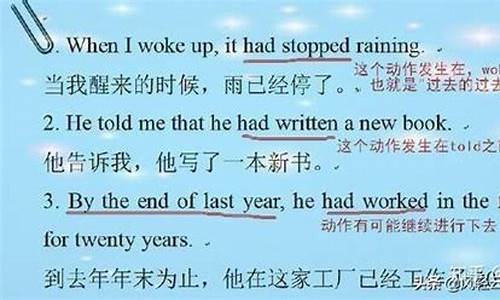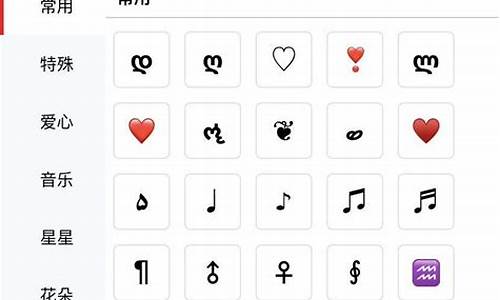过去完成时短句_过去完成时句子大全
1.急急急,谁能帮忙造七个过去完成时态的英语句子,谢谢,适用于现在的初一学生
2.什么时候用过去完成时?
3.写出十个英语过去完成时句子,并标出其中的谓语

一、从结构上区别
现在完成时:主语 + he / has + 过去分词 (肯定式)
主语 + he / has + not + 过去分词 (否定式)
He / Has + 主语 + 过去分词 (疑问式)
过去完成时:主语 + had + 过去分词 (肯定式)
主语 +had + not + 过去分词 (否定式)
Had + 主语 + 过去分词 (疑问式)
(二)从时间状语区别
现在完成时: 常用的时间状语包括 “now, today, tonight, this week, this year, already, yet, just, recently…etc”。
过去完成时: 常用的时间状语包括 “by, at, before等构成的短语”。
注意:当表示一段时间,现在完成时和过去完成时都可以用for 或since引导的状语。
例如:He you had your lunch yet? 你吃午饭了吗?
Yes, I he . I’ve just had it. 是的,我刚吃完。
I he had a clock now. 我现在有一个闹钟了。
He you already posted the photos? 你把照片寄走了吗?
The meeting had begun when we got there. 我们到那儿时,会议已经开始了。
We had learned about 5000English words by the end of last term.
到上学期末我们已经学了5000个英语单词。
They had done the work at five o’clock. 在五点钟的时候他们已经完成了那项工作。
I’ve known Li Lei for three years. 我认识李蕾已经三年了。
I he worked here since ten years ago. 自从十年前我就在这工作。
We had not heard from him since we left here. 自从我们离开以来一直没有收到他的来信。
They had then been without sleep for twenty-four hours.这时他们已经有24个小时没有合眼了。
(三)使用时注意事项
使用现在完成时应该注意:
1.“ he/ has got ”形式上是一种完成时,但和he/ has 为同一意义,即 “有”。
例如:He you got a pen-friend? 你有笔友吗?
Yes, I he. 是的,我有。
Has he got a lot of work to do? 他有许多工作要做吗?
No, he hasn’t. 不,他没有。
2. he/ has gone to 与 he/has been to 的区别
he/ has gone to 强调“去而未归”; he/ has been to 强调“去而归还”。 he/ has
been to常和once, twice, never, ever连用; he/ has gone to则不可。例如:
— He Jack ever been to Beijing? 杰克去过北京吗?
— Yes, he’s been there several times. 是的,他去过好几次了。
— Where he Mary and Tom gone? 玛丽和汤姆去哪里了?
— They’ve gone to London. 他们去伦敦了。
3.非延续性动词不能用于“现在完成时 + 表示一段时间的状语”的句型中。
这类动词有:come, go, start, lee, die, buy, finish, join, borrow, stop等。但它们能够
用表示持续状态的相应的延续性动词替换句中的终止性动词。例如:
arrive, come → be here, be in
begin, start → be on
buy → he
die → be dead
fall asleep(ill) → be asleep (ill)
finish, end → be over
get to know → know
get up → be up
go out → be out
join → be in , be a + 名词
lee, move → be away, be out of
使用过去完成时应该注意:
如果两个动作紧接着发生,则常常不用过去完成时。例如:
When she came into the room, she found them sitting together singing.
她进屋时看见他们坐在一起唱歌。
After we said good-bye to our friends, we left the village.
在和朋友告别之后我们就离开村子。
---------------------------------------------------
现在完成时和过去完成时的区别与用法:
现在完成时着眼于现在,强调过去发生的某动作对现在造成的影响和结果,或是由过去持续到现在的动作。
I he cleaned the classroom .(强调扫地所产生的结果:地干净了!)
We he lived here for ten years.(“住”从过去持续到现在的动作用现在完成时)
We he lived here since we came here.(“住”是从过去持续到现在的动作用现在完成时)
过去完成时则主要体现过去发生的两动作的先后有别,表达的是“过去的过去”,即比过去发生的某动作都还要“过去”,两动作中先发生的就用过去完成时,后发生的则只用一般过去时。运用过去完成时的句子往往有两过去的时间或动作,一定要注意这点哟!
Mr Green had lived in New York for ten years before he came to China.("来”中国已过去,而先前“住”在纽约更过去!)(另外注意:“住”在纽约可没有持续到现在哟!)
We had learned 1000 words by the end of last term.
(“上期期末”已过去,而是在其前“学”的就更过去了!)
-------------------------------------------------------
现在完成时与一般过去时的区别
1. 一般过去时表示过去某个时间发生的事、存在的状态或经常发生的动作。说话的侧重点只在于陈述一件过去的事情,不强调对“现在”产生的影响。如:
He visited Guilin in 1998.他1998年参观过桂林。(只说明去桂林的时间)
2. 现在完成时表示动作发生在过去,对现在造成了影响或产生了结果。不与确定的过去时间状语连用。如:
Jill has bought a new computer.吉尔买了一台新电脑。(着重点是现在有了一台新电脑)
3. 两种时态的区分
(1)一般过去时的谓语动词用过去式,而现在完成时的谓语基本构成是“助动词he /has +过去分词”。如:
(2)一般过去时通常与表示过去的时间状语连用。如:yesterday, last week, two years ago, just now, in 2002等;而现在完成时则常与just, already, ever, never等副词和these days, this week, since..., for...等表示一段时间的状语连用。
看看以下的几组句子,有什么区别?
① He you seen the film?(A)
Did you see the film?(B)
[说明] 你看过这部**吗?(A)句强调的是被问者对剧情是否了解;(B)句强调的是看这部**的动作是否发生过,并不强调是否知道其内容。
② How has he done it?(A)
How did he do it?(B)
[说明]他是怎么做的这件事?(A)句强调的是他做这件事的方式对现在产生了某种影响;(B)句单纯的
询问做这件事的方式。
③ He has lived in Beijing for 8 years.(A)
He lived in Beijing for 8 years.(B)
[说明]他在北京住了8年。(A)句讲的是到目前为止他在北京住了8年,可能还会继续在北京住下去。(B)句讲的是他在北京住过8年,现在不在北京了。
急急急,谁能帮忙造七个过去完成时态的英语句子,谢谢,适用于现在的初一学生
1, I had finished my homework before dinner.
2, By the end of las year Henry had collected more than a hundred stamps
3, When we got there the basketball match had begun
4, The roads were full of people. We hadn't foreseen that.
什么时候用过去完成时?
1. By Sunday night we had got everything ready for the party.
2. They had arrived home by 5:00 p.m.
3. We had finished the job by Friday.
4. He had already left when I got there.
5. We had studied a little Japanese before we came to Japan.
6. I met Mary in the street one morning.She had changed greatly.
7. I didn't want to se the play because I had already seen it.
8. He had worked in the store for 5 yearsbefore he moved here.
9. She told me she had been to Shanghai.
10. By the end of last term we had read 10 short stories.
写出十个英语过去完成时句子,并标出其中的谓语
当你阐述一件事情,表示你在过去就已经做好了,就用过去完成时。
例句: I had?done/finished my homework this morning.?
?我今天早上就已经把作业做完了。
*因为当说出这句话的时候,今天早上已经是属于过去时态了,所以我们用过去完成时,句子里面的"had done/finished"就是过去完成时的形式。
*注意,往往用过去完成时在句子中都会有一个时间状语或者表示时间的副词来表明这件事情是否是在过去发生的,如果没有的话我们往往用现在完成时。
例句: I he done/finished my homework.?
? 我(迄今为止)已经做完了我的作业。
*因为这个句子中不像前一个句子有"this morning"来做时间参照,所以我们默认是一种到当下为止的时间点你已经做好了的事情,所以用现在完成时。
希望你可以理解,祝学业有成,望纳,谢谢!
They had already had breakfast before they arrived at the hotel.2.She had finished writing the composition by 10 :this 00 morning.3.He told me that there had been an argument between them 4.until last semester,we had learned the past tense,the past perfect tense and the future tense and so on.5.They said that production costs had been reduced.6.All the tickets had been sold out when they arrived.7.We had hardly reached the school before it began to rain.8.By the time I got to the bus stop ,the bus had already left .9.Eric died a few days ago and these years,he had lived as a recluse.10.He died,though great efforts had been made to se his life.11.We had learned over two thousand English words by the end of last term.12.They had planted six hundred trees before last Wednesday.13.Before she came to China,Grace had taught English in a middle school for about five years.14.I had learned 1000 English words till then.15 .They had arrived at the station by ten yesterday.
过去完成时,就是had加过去分词,或者加been加表语(被动语态)
声明:本站所有文章资源内容,如无特殊说明或标注,均为采集网络资源。如若本站内容侵犯了原著者的合法权益,可联系本站删除。












